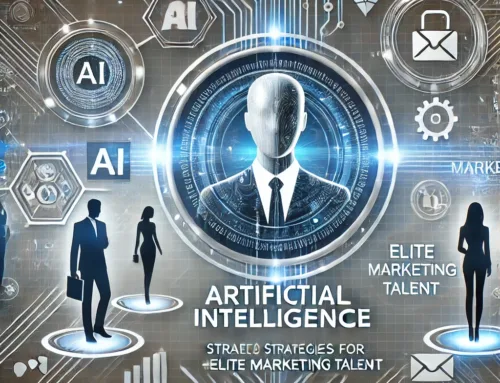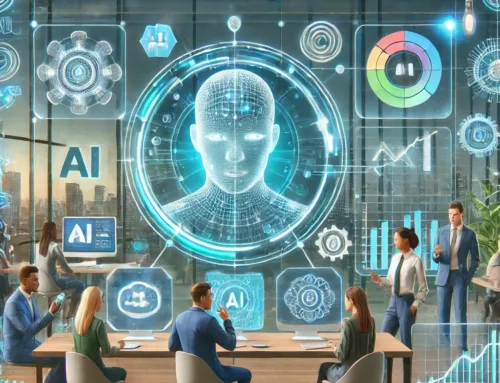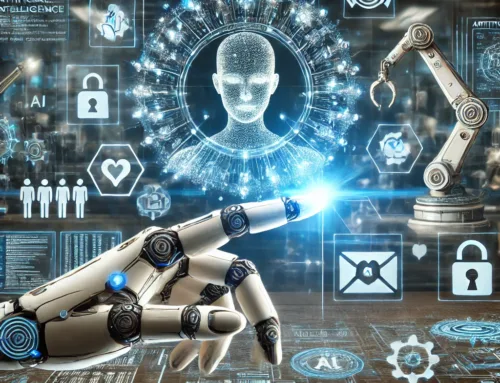The world has been inundated with the influence of artificial intelligence, from chatbots that simplify customer service to search engines that can answer complicated questions instantly. As we dip our toe into the world of machine learning, deep learning, and what AI technology can do, it’s hard not to be amazed at the potential applications for this unknown and untested technology. The recruiting industry has also felt the impact of AI, but executive recruiters are conflicted about whether AI will help the industry or hasten human recruiting positions out the door. The good news is that AI is a fantastic tool that can leverage more productivity and ultimately more effectiveness by sales recruiters, and it doesn’t signal the end of the human executive search industry.
AI and Human Productivity
The common concerns around artificial intelligence are that robots will take over our jobs and reduce human productivity to an unsustainable low. But the truth is that AI has already had an impact on tasks within the workforce of sales staffing agencies, and instead of taking the place of what human recruiters are accomplishing, AI is leading to an increase in human productivity. With the many steps involved in seeking potential candidates for sales positions, sales recruiters are already working in overdrive to match the right candidates with potential employers. The executive search processes of evaluating resumes and job history, developing a relationship with candidates to uncover the right professional fit for their next positions, and ensuring that there is a match on both ends of the equation all come down to the human touch that the sales recruiters can provide. And with the assistance of AI technology, there is more time to provide the human judgment that no artificial intelligence programming is able to provide.
How Executive Recruiters Should Be Using AI
Other closely related industries, like HR, have already implemented AI technology to increase productivity and streamline tasks. Understanding how to integrate the strengths of AI into an executive search position can leverage the most helpful aspects of the technology while putting the focus on what only a live person can bring to the table.
How HR is Already Utilizing AI
Many of the rote tasks that human resources professionals need to do are increasingly using AI to free up time for more personalized job responsibilities. AI assists with records management, primary payroll data collection and even some automated onboarding undertakings that do not need a live person to complete. HR is also automating manual tasks related to recruiting like using chatbots to create appropriate recruitment questions or developing personalized training according to a new hire’s experience. But the most positive outcome of HR departments depending on AI to support their live staff is that all of these automated tasks give HR professionals time to focus on the tasks that require human judgment and building relationships within the company.
How AI Benefits Recruiters Right Now
Since AI technology has the immediate capability to complete tasks that take a lot of a sales recruiter’s time, the strongest benefit of using AI is that it maximizes a sales recruiter’s time completing meaningful tasks.
1. AI can be used to identify a candidate’s technical skills and qualifications quickly and accurately. Scanning resumes and candidate questionnaires for keywords and compiling a list of a candidate’s strengths or abilities can save huge amounts of time for a human recruiter.
2. AI can help to identify the right pool of candidates and human recruiters can begin their work of getting to know the candidates more quickly.
3. The use of AI programs helps to reduce or eliminate bias in the recruiting process. Unconscious bias is always going to be a challenge when humans are part of the process, but AI can help assure recruiting professionals that their initial stages of candidate evaluations are bias-free and they can cast the widest net possible to find the right candidates without unintentionally being swayed by personal bias.
What AI Cannot Do
Advanced artificial intelligence programs cannot take the place of humans because they cannot build relationships, make judgments and think critically about situations. When sales recruiters automate tasks with AI, they can free up time to work directly with potential candidates and others in the hiring cycle, demonstrating their indispensable human side within the industry.
- Soft Skills Recruiters can focus on identifying the soft skills of their clients and evaluate the aspects that make them strong candidates like their true communication skills and how teamwork has been a part of their work history.
- Company Culture Sales recruiters need to understand the corporate culture that they are placing candidates into to ensure the best possible fit. With enough time, a human recruiter can ask the right questions and get an accurate feel for the culture.
- Candidate Relationships Human sales recruiters have the unique ability to connect with candidates, using their own highly honed interpersonal skills to get to know them and make them feel valued during the recruitment process.
- Hiring Process A sales recruiter looking to hire sales reps can make sure that the process goes smoothly by following up with both parties, providing support to hiring managers and steering candidates over and around the sometimes arduous path to a new career placement.
- Human Judgment Something that is not replaceable, sales staffing agencies provide the human touch to make decisions throughout the hiring process. The inclusion of AI technology in menial but critical tasks highlights the disparity between what a human recruiter brings to the table and the capabilities of modern AI.
- Guidance The assistance and support that executive recruiters provide to hiring managers is based on nuance, experience and instinct, all traits that cannot be provided through the algorithms of machine learning.
- Candidate Communication While basic chatbot communication can be automated, there is no substitute for live communication with a potential candidate going through the recruitment process. Human recruiters provide opportunities for authentic communication with sales professionals at every stage of the recruiting process.
- Fairness A human recruiter can oversee the hiring process to ensure that it is fair and inclusive. Because they can see the whole picture and not just a snapshot in time revealing a candidate’s qualities or skills, a recruiter can make judgment calls about the overall process.
What’s Next?
The use of AI is likely only to increase in the near future, and recruiting professionals will see some critical needs met with the opportunities to use AI’s evolving technology. One way that AI will materially support recruitment professionals is by providing quick data on natural language processing (NLP). Artificial intelligence will be able to assess foreign language processing in candidates, widening the net for their potential employment and taking the burden off of recruiters for knowing that candidate’s fluency with certainty. The technology will soon be able to provide an evaluation of a candidate’s phone skills, providing insight into expertise that plays a large role in the success of many sales professionals.
The future of AI within the recruiting industry will undoubtedly include chatbots. They can be utilized at the early stages of candidate communication to answer questions about resume gaps that may take a human recruiter precious time and energy to discover. And just like many businesses employ personality assessments on potential or new hires, recruiting firms will see the option to use neuroscience games powered by AI technology to assess a candidate in a variety of ways. Gamification can help demonstrate a candidate’s risk-taking propensity, ability to project plan as well as information processing skills. AI is likely to assist executive recruiters reach the right candidate in the future as well by assisting in creating personalized marketing messaging. By targeting the right candidate more effectively, the hiring process will be even more streamlined and successful in the future.
Moving Forward: Integrating AI in Your Recruiting
The true impact of how artificial intelligence will change the world is still unknown, but we do know that this technology has the potential to make the recruiting profession better. Recruiters who view AI as a support tool will rapidly see the benefits in the business. Leaning into its ability to automate tasks will give human recruiters more time to dig deeper into a candidate, to get to know them and to oversee the recruitment process. And the growing use of AI in the recruitment industry will make the human recruiter’s value even more obvious by increasing the client-facing tasks that allow the recruiter’s critical thinking skills and career-honed intuition to shine. Early adopters will likely see the benefits of leveraging this new technology into their business but eventually, it is likely that just about everyone will integrate some aspect of AI into their business in the future. Which one will you be?
Share This Story, Choose Your Platform!
What our happy clients are saying
Contact Us for a Free Consultation
Tell us more about your business and how we can help.












